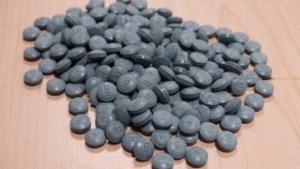With two drug overdose warnings issued in a matter of days in Waterloo Region last week, concern grows among community and frontline workers.
Waterloo Region Integrated Drugs Strategy reported a "significant increase" in overdoses linked to light blue, teal or turquoise fentanyl.
“There is a great deal of concern about toxic, unpredictable substances in all communities across Canada, including Cambridge. Even when there's no overdose alert, the substances out there are generally not predictable or safe,” says Violet Umanetz, director of harm reduction and overdose prevention services/supervisor of consumption and treatment services (CTS) Kitchener at Sanguen Health Centre.
Waterloo Region Integrated Drugs Strategy did not indicate how many overdoses were tied to the recent alerts, but Umanetz says many overdoses in the community go unreported if 911 isn't called or if they happen away from a consumption and treatment site.
“So, the numbers we see are always understated,” she said.
Drugs such as an extremely toxic 'red' fentanyl in surrounding communities has also prompted alerts.
“The colour of substances sold in the community can, and does, change quickly. We know that something sold as a 'red fentanyl' today can quickly become a blue or purple fentanyl tomorrow. With our limited ability to test substances, it's impossible to know the content, potency, or quality of the drugs being purchased and used,” Umanetz said.
“We always encourage people to use their drugs at the CTS, especially the first use of a new batch, so any adverse reactions can be managed quickly by our staff.”
Emergency Services in Waterloo Region have responded to an increased number of calls related to dangerous and unexpected reactions in recent weeks according to Waterloo Region Integrated Drugs Strategy.
Unexpected reactions are life threatening and can include extreme agitation, unexpected physical aggression, hallucinations, paranoia, hypothermia, and delirium.
If someone is overdosing, call 911, administer naloxone if an opioid overdose is suspected, do not give stimulants, such as crystal meth, as it can make the overdose worse. Assist the victim until paramedics arrive, and travel with the victim to the hospital.
"It's important to understand that naloxone, also known as Narcan, works to temporarily reverse any opioid overdose, regardless of the colour or strength, but does not have any effect on non-opioid substances. Over the past few months we have seen an increase in substances colloquially known as "benzo dope" - drugs containing strong or significant amounts of suspected benzodiazepines. Benzodiazepines are a class of drugs that have some similarities to opioids in that they slow down the central nervous system and suppress people's natural urge to breathe," Umantez said.
When taken in large doses or when combined with other sedating substances, the overdose risk can be significant and naloxone will not reverse that overdose according to Umantez.
"With any overdose where breathing is suppressed, however, we recommend using naloxone - it can't hurt and may help if there's even a small amount of opioids in the person's system," Umantez said.
“Unfortunately, any of the unregulated substances in our community can be toxic. There's no way to know. We always recommend carrying a naloxone kit and knowing how to use it, even if you don't use drugs or don't think you know anyone who does. As the holidays approach and as people gather, keeping a kit on hand can't hurt. There is no risk to administering naloxone to someone, even if they're not overdosing. You could save someone's life.
“While the CTS is not located in an area that's easy for people in Cambridge to access, I would encourage people who use drugs to stop by the Kitchener CTS and use their first dose there if possible. Do a test shot of your drugs, use a small amount and see what the effects are before using more."
They added to try not to use drugs alone but, if you have no other option, call the overdose prevention phone line.
For more information, visit https://www.nors.ca/.
Sanguen Heath Centre is a not-for-profit, community-based health care agency with offices in Waterloo and Guelph that provides wrap around support to those experiencing high degrees of marginalization as a result of their substance use, mental health, homelessness and chronic poverty.
“The work may be hard at times, but we're never doing it alone. We truly love people who use drugs - they are our friends, co-workers, family, patients, clients, and community. They inform our work and tell us what's needed and how we can help,” Umantez said.
“We consider it a privilege to do the work that we do, but we couldn't do it without the strong partnerships with agencies across Waterloo Region who are working toward the same goals.”
Naloxone kits can be picked up at no cost at various locations across Waterloo Region. For more information, call (519) 575-4400 or visit here.



